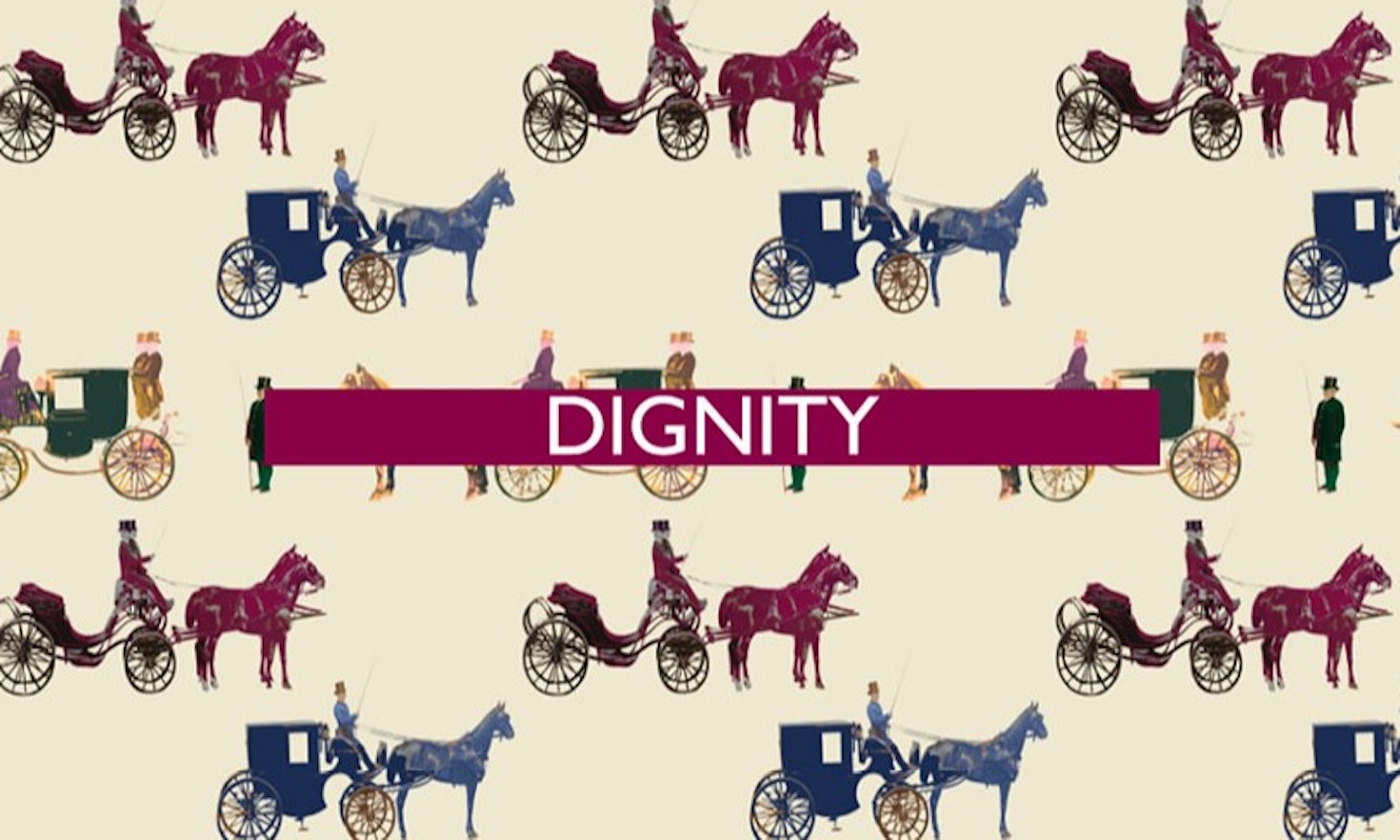The 1st of all EU-r rights: dignity and how the Charter contributes

Can a legal text impress by its beauty? Yes, it can. Have a try: “Human dignity is inviolable. It must be respected and protected”. [1] This shortest of all rights in the EU Charter of fundamental rights, is the first one of over fifty others. It describes what makes us humans and points – in the words of Peter Bieri – to a “way of living”.[2] A dignified life, is a life under our own sovereignty, not unlike the coachman sitting on his carriage in the image above by Miloladesign. Dignity is the ability of humans “to become authors of their lives and thus of their autonomy”. It implies a prohibition “of instrumentalisation and objectivation”of any us as we are all human beings.[3]
The Charter in action
It was in May 2013 when a twelve year old boy went shopping with his father in the city of Rijeka in Croatia. When leaving the shop, the anti-theft alarm went off. The boy was checked by the security guard in a manner causing fear and shame in front of a large group of people. The police arrived and concluded that no theft had been made. Nevertheless the security guard went on checking the applicant’s shoes as well. The instance was brought before court where the boy claimed compensation for the violation of the right to human dignity and reputation and for the violation of his personality. However, the local court found that a twelve year old child, who has not formed a perception of his personal reputation and dignity, does not have a right to compensation for damages on that basis. The Constitutional Court of Croatia, in contrast, nullified the decisions rendered by lower courts.[4] It recalled that not only does Article 35 of the Croatian Constitution “guarantee” dignity but Article 1 of the EU Charter declares dignity as inviolable. By committing to the contents of the Charter, so the Court explained, the Charter’s understanding of dignity became a component of the human rights catalogue of the Croatian Constitution.[5]
Two examples of how the EU Court protects dignity
|
Cases like this show that the Charter can make a difference in courtrooms – and in real life. However, the right to dignity is rarely used by the Court of Justice of the European Union –once or twice per year whereas on average other Charter rights are used five times as often. The rather rare use of ‘dignity’ can be explained by the fact that dignity is encapsulated also in many other more specific rights. In fact, one of the seven ‘titles’ (chapters) of the EU Charter is called ‘dignity’ and includes next to dignity in Article 1 the following rights: the right to life (Article 2), the right to the integrity of the person (Article 3), the prohibition of torture and inhuman or degrading treatment or punishment (Article 4) as well as the prohibition of slavery and forced labour (Article 5).
What do the constitutions of the Member States say?
Only a handful of the 28 EU Member States do not refer to dignity in their constitutional texts.[6] In Germany, Romania and Portugal, dignity is put in the very first Article of the respective constitution and in Bulgaria and Spain dignity is mentioned in the preamble. Other constitutions provide dignity with a special role: The constitution of Belgium states that fundamental rights are guaranteed in order that everyone has the right to lead a life with human dignity.[7] Article 30 of the Polish constitution says that dignity constitutes the “source of freedoms and rights of persons and citizens”.
Next to general references to dignity, national constitutions often establish the obligation to respect dignity in specific contexts thereby showing where the legal and political systems identify special risks for our dignity:
- detention (Austria and Slovenia)[8],
- deportation (Finland)[9],
- procreation (Portugal)[10],
- the freedom of expression (Romania)[11],
- misuse of information and technology (Portugal) or even
- business as is the case in Article 41 of the Italian constitution or Article 106 of the Greek constitution which states: “Private economic initiative shall not be permitted to develop at the expense of freedom and human dignity”.
Three examples of how EU legislation protects dignity:
|
The Finnish constitution links dignity to social rights by stating that those “who cannot obtain the means necessary for a life in dignity have the right to receive indispensable subsistance and care”.[12] In a similar vein, the constitution of Portugal establishes that work is to be organised “under conditions of social dignity”.[13] This social orientation of the right to dignity is also reflected in the EU Charter as dignity is also referred to in the context of the elderly who are entitled to “to lead a life of dignity and independence”[14] as well as in the context of working conditions: every worker has the “right to working conditions which respect his or her health, safety and dignity”.[15]
So what?
Admittedly, ‘dignity’ sounds like an abstract concept. But legally speaking it is the mother of all rights. It is absolute and cannot be restricted. While being a self-standing guarantee it also forms the core of all other Charter rights: none of these rights “may be used to harm the dignity of another person, and … the dignity of the human person is part of the substance of the rights laid down in this Charter. It must therefore be respected, even where a right is restricted.”[16] Over 80% of more than the 190 States on this planet refer to the concept of dignity in their constitutions.[17] But not all of these legal systems necessarily pull in the same direction as Article 1 of the EU Charter does as the example from China might show.[18] The very prominent standing of dignity in the EU Charter clearly signals that it is the human being that needs to stand at the centre of all EU law and policy making.[19] Interested in knowing more about the Charter? Well, here you are: ‘All EU-r rights‘, stay tuned!
 |
Gabriel N. Toggenburg is an Honorary Professor for European Union and Human Rights Law at the University of Graz, Austria. He worked as a Senior Researcher for Eurac Research in Bolzano/Bozen (Italy) from 1998 to 2008. Since 2009, he has been working for the European Union. All views expressed are his own and cannot be attributed to his current or former employers. His blog series “All EU-r rights” published on EUreka! aims at making the EU Charter of Fundamental Rights better known. He is grateful for the honour to have every blog entry introduced by a piece of art by Miloladesign. An annotated list of all Charter rights is available here. |
[1] This is not to say that there are not many other examples of beautiful constitutional texts. Think of the constitution of South Africa which puts in simple words what often is forgotten these days by many citizens in many countries: We “believe that South Africa belongs to all who live in it, united in our diversity”.
[2] Peter Bieri, Human Dignity: A way of living, 2016. It is the philosopher Bieri who stands behind the breath-taking bestseller “A night train to Lisbon” that he published in 2008 under the pseudonym Pascal Mercier.
[3] A wisdom that can be traced back to Immanuel Kant. See Matthias Mahlmann, Human dignity and autonomy in modern constitutional orders, in M. Rosenfeld and Andras Sajo, The Oxford Handbook of comparative constitutional law Oxford 2012, 371-3416, at 378.
[4] Decision U-III-1095/2014, 21.09.2017.
[5] This however does not imply that EU law would impose a harmonised reading of dignity across all the 28 EU Member States. The EU-Court in Luxembourg made this clear in its Omega ruling: the German police forbid the installation of a “laserdrome” in Bonn. The establishment used machine-gun-type laser targeting devices and sensory tags fixed either in the firing corridors or to jackets worn by the players. The game was prohibited because it “simulated homicide and the trivialisation of violence” and thereby found to be contrary to Art. 1 of the German Basic Law – a provision which heavily influenced Art. 1 of the EU Charter (via Roman Herzog who presided over the European Convention drafting the Charter). The EU Court accepted that dignity may justify a restriction of the common market freedoms. But can Germany use its exceptionally strong notion of dignity to justify restrictions to the common market? The Court said the following: there is no need for “a conception shared by all Member States as regards the precise way in which the fundamental right or legitimate interest in question is to be protected”. EU law leaves room for specific national identities and interpretations – also in the context of fundamental rights. CJEU, C-36/02, 14. September 2014, Para 37.
[6] See the constitutions of Cyprus, Denmark, Luxembourg, Malta and the Netherlands.
[7] Art. 23 of the Belgium constitution. Compare also Art. 10 of the Estonian constitution.
[8] Art. 11 of the Austrian Federal Constitutional law on the Protection of personal liberty and Art. 21 of the Slovenian constitution.
[9] Section 9 of the Finnish constitution.
[10] Art. 67(2) of the Portuguese constitution.
[11] Art. 30 of the Romanian constitution.
[12] Section 19 of the Finnish constitution.
[13] Art. 9 of the Portuguese constitution.
[14] Art. 25.
[15] Art. 31.
[16] Official explanations to the Charter.
[17] Doron Schulztiner and Guy E. Carmi, Human Dignity in national constitutions: functions, promise and dangers, in American Journal of Comparative Law, vol. 62, No. 2, 2014, pp. 461-490.
[18] The constitution of China also refers to dignity. Next to a more classical clause on dignity in Art. 38, Art. 5 states that the state upholds the “dignity of the socialist legal system” and the preamble establishes a duty of the citizens to uphold the dignity of the Constitution!
[19] This was the conclusion by the representative of the EU’s Court of Justice participating as an observer on the process of drafting the Charter in the European Convention, see CHARTE 4959/2000 54.
Citation
This content is licensed under a Creative Commons Attribution 4.0 International license except for third-party materials or where otherwise noted.





